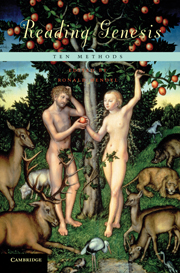Book contents
- Frontmatter
- Contents
- Contributors
- Acknowledgments
- Reading Genesis
- Introduction
- 1 Literature
- 2 Cultural Memory
- 3 Sources and Redaction
- 4 Gender and Sexuality
- 5 Inner-Biblical Interpretation
- 6 Rabbinic Interpretation
- 7 Interpretation in the Early Church
- 8 Translation
- 9 Modern Literature
- 10 Modern Theology
- Index of Biblical Citations
- General Index
- References
2 - Cultural Memory
Published online by Cambridge University Press: 05 June 2012
- Frontmatter
- Contents
- Contributors
- Acknowledgments
- Reading Genesis
- Introduction
- 1 Literature
- 2 Cultural Memory
- 3 Sources and Redaction
- 4 Gender and Sexuality
- 5 Inner-Biblical Interpretation
- 6 Rabbinic Interpretation
- 7 Interpretation in the Early Church
- 8 Translation
- 9 Modern Literature
- 10 Modern Theology
- Index of Biblical Citations
- General Index
- References
Summary
Memory, wrote Augustine in his Confessions, is “the present of things past.” The past exists only in our present memories and is mediated by places, objects, texts, and customs. As individuals, our past selves and relationships persist only to the extent that we remember them. However, individual memories also can be of events that never happened or that did not happen in quite the way we remember them. Memories recall the past in a way that re-creates the past, foregrounding and embellishing certain parts and suppressing others. No one has total recall; our memories are always partial, meaning that they are both incomplete and biased, colored in various ways. Memory is unreliable, but it is also the foundation of our sense of self.
Cultures also have what we can call memories. Often, these are memories of the formative past when an ancestral group underwent crucial transitions. Children are initiated into cultural memories as part of the process of acculturation, and these shared memories comprise an essential ingredient and causal agent of group identity. The shared memories of a culture are subject to the same types of changes as individual memory. They are a blend of historical details and imaginative embellishments, blending and crystallizing differently according to the concerns and experiences of each generation.
- Type
- Chapter
- Information
- Reading GenesisTen Methods, pp. 28 - 46Publisher: Cambridge University PressPrint publication year: 2010
References
- 2
- Cited by



